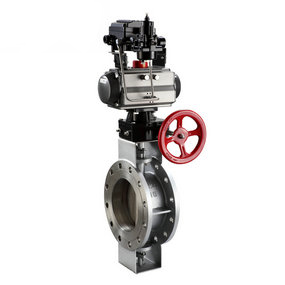Which one is good for stainless steel pneumatic ball valve? What are the classifications of pneumatic butterfly valves?
1. Hydraulic pneumatic butterfly valve:
Hydropneumatic butterfly valves are widely used in automobile suspension systems. The principle is that when the frame and the axle move reciprocally and the piston moves reciprocally in the cylinder barrel of the pneumatic butterfly valve, the oil in the pneumatic butterfly valve housing flows repeatedly from the inner cavity through some narrow pores into another inner cavity. At this time, the friction between the liquid and the inner wall and the internal friction of the liquid molecules will form the damping force for the vibration.
2. Inflatable pneumatic butterfly valve:
Inflatable pneumatic butterfly valve is a new type of pneumatic butterfly valve developed since the 1960s. Its structure and point are that a floating piston is installed at the lower part of the cylinder barrel, and a sealed gas chamber formed by the floating piston and one end of the cylinder barrel is filled with high-pressure nitrogen. The floating piston is equipped with a large section O-ring, which completely separates oil and gas. The working piston is equipped with a compression valve and an extension valve that can change the cross-sectional area of the channel according to its movement speed. When the wheels are bouncing up and down, the working piston of the pneumatic butterfly valve reciprocates in the oil, causing the oil pressure difference between the upper chamber and the lower chamber of the working piston, and the pressure oil pushes open the compression valve and the extension valve to move back and forth. Because the valve has a greater damping force on the pressure oil, the automobile air valve attenuates the shock.
3. Diaphragm pneumatic butterfly valve
With the development of automobile industry and industrial technology, and the use of high-strength nylon, Kaplon and other cord fabrics, membrane pneumatic butterfly valves have been widely used on the suspension of domestic and overseas buses in recent years. For example, this type of ball valve is used on buses such as Leland, Wuhan WH644 and WH643. Its characteristics are:
a. It can be regarded as the formation of the lower cover plate of the bladder pneumatic butterfly valve into a piston. Because this change has greatly improved the elasticity and performance of the pneumatic butterfly valve, and obtained a more ideal anti "S" shaped ball valve and performance curve than the bladder type pneumatic butterfly valve. It can be seen that in the normal operating range of the membrane pneumatic butterfly valve, the stiffness change of the ball valve is smaller than that of the bladder pneumatic butterfly valve. Therefore, in terms of the vibration mechanism, the membrane pneumatic butterfly valve is much better than the bladder pneumatic butterfly valve It is worth mentioning that the diaphragm pneumatic butterfly valve can control the change rate of its effective area by changing the shape and size of the piston to obtain ideal elasticity and performance. This is not easy to do for the pneumatic butterfly valve.
b. The change rate of the effective area of the membrane pneumatic butterfly valve is smaller than that of the capsule pneumatic butterfly valve. Therefore, the membrane pneumatic butterfly valve can obtain a lower natural vibration frequency when the auxiliary air chamber is smaller. However, it is not easy for the bladder pneumatic butterfly valve to design the ball valve with a very low frequency.
c. At present, the sealing form of the membrane pneumatic butterfly valve is generally pressure self sealing, while the sealing of the bladder pneumatic butterfly valve is generally clamped with screws, so the sealing of the membrane pneumatic butterfly valve is simple and easy to assemble and disassemble.
d. Diaphragm pneumatic butterfly valve is simple in manufacture and convenient for mass production.
Mainly used for vibrating machinery, double deck passenger cars, trucks and other industrial machinery. Ball valves are commonly used in mechanical equipment, vehicle running mechanism and suspension system, playing a role of shock absorption and buffering.


